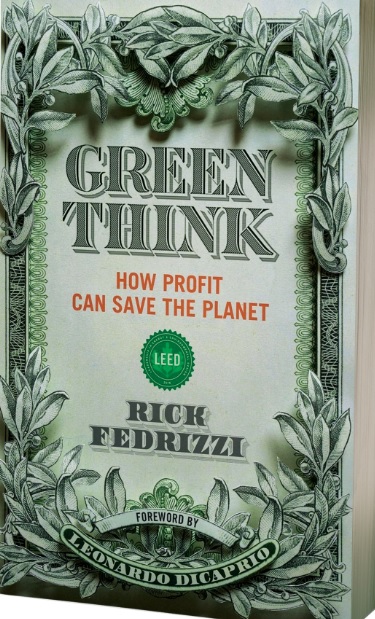Standing on its head the long-held notion that the private sector and sustainability are, in principle, two binaries which can never meet, CEO and Founding Chair of the U.S. Green Building Council, Rick Fedrizzi, in his book Green Think: How Profit Can Save the Planet argues that when businesses and environmentalists join hands, not only can the planet be saved, but the endeavour could also prove profitable. The book, since its publication late last year, has become a manifesto of sorts for businessbacked sustainability. George Berbari gives glimpses of the author and the book…
 Rick Fedrizzi was my colleague when I was working for Carrier in the early 1990s, where he introduced the sticker labels that covered refrigerants, energy efficiency, etc. for Carrier air conditioners. In 1993, through co-founding U.S. Green Building Council (USGBC), Fedrizzi led the transformation of architectural and real estate practices, and spearheaded the most important and far-reaching sustainability movement of our time.
Rick Fedrizzi was my colleague when I was working for Carrier in the early 1990s, where he introduced the sticker labels that covered refrigerants, energy efficiency, etc. for Carrier air conditioners. In 1993, through co-founding U.S. Green Building Council (USGBC), Fedrizzi led the transformation of architectural and real estate practices, and spearheaded the most important and far-reaching sustainability movement of our time.
Fedrizzi oversaw the creation of LEED. Since then, the USGBC has accredited over 200,000 LEED professionals, 4.5 billion ft² of institutional and commercial buildings, and almost 200,000 residential units. Its third-party certification organisation, GBCI, now certifies to new initiatives, such as Sustainable Sites and development, PEER (Performance Excellence in Electricity Renewal), EDGE (Excellence in Design for Greater Efficiencies) and WELL (overall health and wellness).
USGBC is growing at a fast pace and certifying 1.85 million ft² of building space daily, and possibly half of new commercial buildings built in the United States will be LEED certified or follow part or all of their construction standard.
The intention of this preamble is to place Fedrizzi’s 2015 book Green Think: How Profit Can Save the Planet in perspective.
The book comprises eight chapters that capture Fedrizzi’s epic journey, and the organisations and people he has encountered along the way. But the most compelling argument he offers is that capitalism and profit-making do not contradict environmental concerns. On the contrary, he firmly believes that companies and individuals alike have saved billions of dollars in material and energy consumption, and that it is one of the key success pillars of USGBC. In Chapter 8 – Environmentalism 2.0 – Fedrizzi brings to culmination his philosophy in the following statement:
“Don’t distrust the profit motive – leverage it
Don’t fear the private sector – partner with it
Don’t ignore the marketplace – embrace it
And, more than anything else… don’t waste the opportunity.”
With the Foreword by actor and environmentalist Leonardo DiCaprio, the book is endorsed by Art Gensler, founder of Gensler Architecture; Paul Scialla, founder of Delios Living; and Gail Vittori, Co-Director of Maximum Potential Building Systems.
Apart from its central theme, what one could take home from the book are ‘Report and Review’ – two ‘R’s introduced in Chapter 7 – added to the established three pillars of sustainability – ‘Reduce, Reuse and Recycle’.
The book, published to wide acclaim, can best be summed up by the words, “You will recognise them by their fruits”, which reflects both Fedrizzi’s work and his book. And what a refreshing fruit it is to our planet!
It is my great pleasure to introduce Fedrizzi and his book to the readers of Climate Control Middle East, most of whom have undoubtedly heard of him, and wholeheartedly embraced the Green Building movement he initiated.
Green Think: How Profit Can Save the Planet is sold via Amazon, and Fedrizzi has allocated all proceeds to USGBC’s Center for Green Schools and Project Haiti initiatives.
The reviewer is the CEO of DC PRO Engineering. He can be contacted at gberbari@dcproeng.com.
Note: The July issue of Climate Control Middle East will feature an exclusive interview with Rick Fedrizzi.
Copyright © 2006-2025 - CPI Industry. All rights reserved.